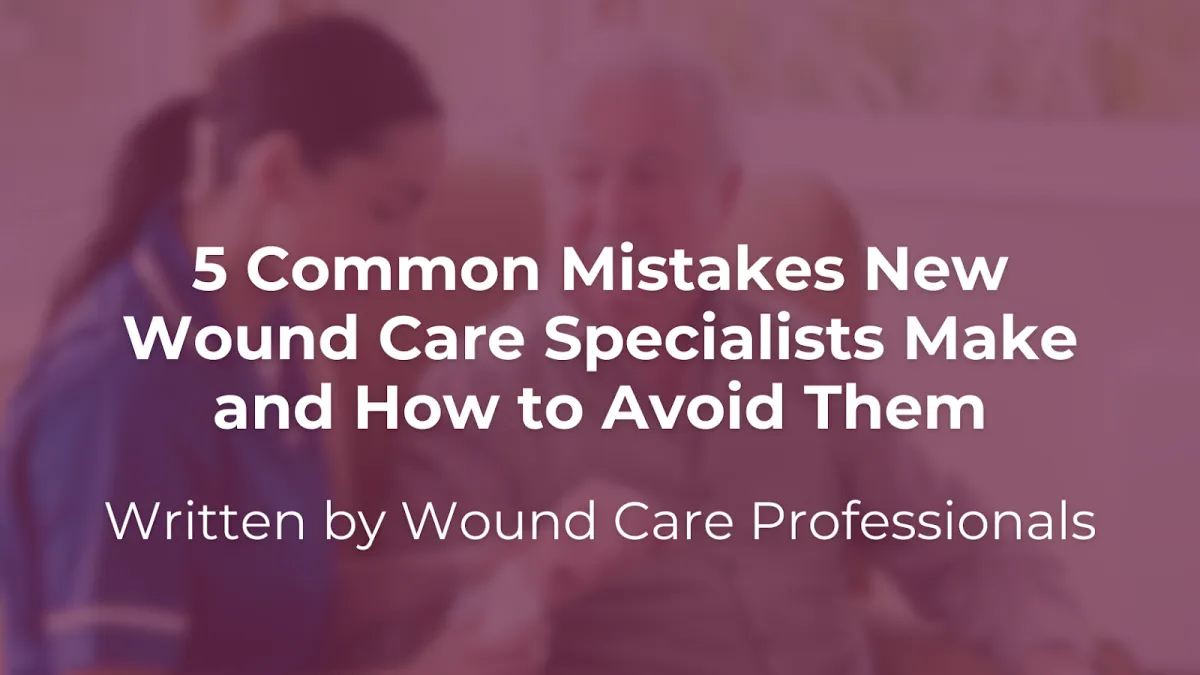wound care insights blog
Real-World Tips. Expert Voices.
Smarter Healing.
Stay ahead in wound care with expert-led articles, practical strategies, clinical updates, and stories from the field. Designed for busy professionals who want real answers—not fluff.

5 Common Mistakes New Wound Care Specialists Make and How to Avoid Them
As a new wound care specialist, it is easy to feel overwhelmed. From choosing the right treatments to keeping up with the latest best practices, the pressure to deliver compassionate, evidence-based care is real. At Wound Care Professionals, we have worked with thousands of care providers and understand the steep learning curve that comes with entering this dynamic field.
To help you build confidence and improve patient outcomes from day one, we have outlined the five most frequent mistakes new wound care specialists make and, more importantly, how to avoid them. Think of this as your insider cheat sheet for early success.
1. Choosing the Wrong Wound Dressing
This is one of the most common errors and one of the most avoidable. With hundreds of products on the market, new clinicians often default to dressings they are familiar with rather than what is clinically indicated.
The mistake: Using the same dressing across different types of wounds or choosing a product based on availability rather than evidence.
How to avoid it: Build a strong foundation in wound assessment and dressing selection. Invest in wound care education that demystifies product categories and focuses on function, not brand. Our wound care certification courses offer practical, hands-on instruction that simplifies product matching based on wound characteristics like exudate level, depth, and tissue type.
2. Incomplete or Inaccurate Documentation
Documentation in wound care is both a clinical necessity and a legal safeguard. Yet many new wound care specialists struggle to capture the full picture.
The mistake: Skipping important descriptors like wound dimensions, periwound condition, or drainage amount.
How to avoid it: Use standardized wound care documentation tools and stay consistent with terminology. Accurate documentation supports care planning and reimbursement while enhancing communication across teams. Downloadable templates and detailed charting guides are often included in our training materials.
3. Underestimating the Importance of Multidisciplinary Collaboration
Wound care does not happen in a vacuum. Successful healing involves nutritionists, infection control, physical therapists, and more.
The mistake: Trying to manage wound healing in isolation without involving the broader care team.
How to avoid it: Proactively engage a multidisciplinary team. If you see signs of infection or delayed healing, loop in relevant specialists. With wound care education that includes case-based learning, you will gain real-world strategies for collaboration that can make or break your outcomes.
4. Neglecting Offloading and Pressure Redistribution
Even the best wound care treatment will not work if the wound keeps getting re-injured. This is especially critical for pressure injuries and diabetic foot ulcers.
The mistake: Focusing on topical treatments without addressing pressure points or mechanical contributors.
How to avoid it: Always assess and document pressure relief strategies, such as repositioning schedules, support surfaces, and patient education. Understanding biomechanics is a must, and it is a core topic we cover in our advanced wound care training.
5. Skipping Ongoing Education
Wound care is a fast-evolving specialty with frequent advancements in treatment modalities and products.
The mistake: Assuming once you are trained, you are done learning.
How to avoid it: Make continued learning a priority. Join wound care education forums, attend conferences, and stay connected with providers who specialize in advanced wound treatment. At Wound Care Professionals, we offer webinars, CEU opportunities, and a supportive community of clinicians to help you stay at the forefront of the field.
Join our network of forward-thinking wound care specialists.
Subscribe to Our Community
Bonus Tip: Seek Mentorship Early
One way to accelerate your development is to find a mentor in wound care. Learning from experienced professionals, whether through formal consulting or peer support, is one of the most effective ways to build your expertise.
At Wound Care Professionals, we believe in combining education, mentorship, and resources to help you build expertise quickly and confidently. We are proud to be founded by industry leader Nancy Morgan, a trailblazer in hands-on wound care training and provider empowerment.
Wound Care Success Starts with Smart Choices
Starting your career in wound care does not have to feel overwhelming. By avoiding these common pitfalls, such as product missteps, poor documentation, siloed treatment, pressure oversight, and complacency, you can set yourself up for long-term success, better patient outcomes, and more confidence in your clinical decisions.
Ready to take the next step in your wound care journey?
Contact Wound Care Professionals today to learn more about how we can help you get wound care certified.
Schedule a Free Consultation
Fall into one of these Categories? We'd Love To Help You Grow!
NURSES
PHYSICIANS
THERAPISTS
CNA/MA
MEDICAL INDUSTRY
HEALTHCARE PROFESSIONALS
HEALTHCARE ORGANIZATIONS
UNLICENSED HEALTHCARE PROFESSIONALS
INTERNATIONAL HEALTHCARE PRO
Check our what our WCP Community Members are saying...
The founder of Wound Care Professionals, Nancy Morgan has been a true inspiration on my journey to furthering my wound care education. I am deeply grateful for the opportunity to learn from WCP and continue to grow in this vital area of healthcare.

Bianca S.
MHA, BA, LVN


Innovation
Fresh & Creative Solutions

Integrity
Honesty and Transparency

Excellence
Top-Notch Services

COMPANY
LEGAL
CUSTOMER CARE
FOLLOW US
COMPANY
Proverbs 16:3 - Commit your actions to the Lord, and your plans will succeed.
RESOURCES
CUSTOMER CARE
FOLLOW US
Copyright 2025 Indiana, USA. All Rights Reserved.
